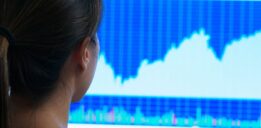Will the Current Earnings Season Turn the Stock Market Boom to Crash?
Federal Reserve Chair Janet Yellen wants to join the “famous last words club.” She recently declared that she does not expect another financial crisis in “our lifetimes.” Historical precedent suggests such outbursts of optimism are an important sign that a stock market crash is coming. (Source: “YELLEN: I don’t believe the next financial crisis will be ‘in our lifetimes’,” Business Insider, June 27, 2017.)
On October 17, 1929, Professor Irving Fisher enthusiastically proclaimed that stock prices had reached a “permanently high plateau.” That was just days before the most significant stock market crash of the 20th century. Austrian-born economist Joseph Schumpeter described Fischer as “the greatest economist the United States has ever produced.” Yet, just as the Fed is now, he failed to see the obvious, which is that the stock market is overvalued.
Also Read:
The Janet Yellen Rate Hike Could Unleash U.S. Financial Collapse 2017
U.S. Interest Rate Prediction for 2017 Means a Return to High Stakes Risk
Yellen, Schumpeter, and Fischer were surely competent academic economists. They have produced papers, and wrote and spoke eloquently. They earned a strong academic reputation. The problem is that economics, unlike many would like to believe, is not a science that deals in certainties. It’s not even a science, yet modern economics uses more mathematics in its “models” than physicists at NASA.
Not surprisingly, and not without some scholarly arrogance, economists are often the last to realize when a problem is about to hit, not to mention the scale of its consequences. Perhaps psychologists and sociologists should be the ones to offer market predictions. Yes, the markets move far more according to whims and sensation than they do on economic principles.
Follow the Money and Understand the Nature of Greed
If you do those things, you will have greater chances of success in preventing your savings from turning to dust in a crash. Earnings per share (EPS) numbers are simply too low to justify the current valuations. Besides, many companies are posting adjusted EPS; these are earnings that have undergone some massaging. Better, yet, they’ve undergone “plastic surgery” to make them look better.
Not surprisingly, generally accepted accounting principles (GAAP) are losing ground. Companies are preferring to report pro forma results versus GAAP. Why do you think that is, dear reader? Because GAAP earnings tend to be lower, as much as 25% lower than pro forma results. (Source: “Why You Need to Know About ‘Pro Forma’ Versus GAAP Earnings,” FXStreet, July 9, 2017.)
Is it any wonder that the S&P 500 Index has reached its highest ever peak? What should scare investors, however, is that the S&P 500 just like the GAAP earnings or any other kind of indicators is based on past performance. It’s true that the past is important and that it provides the basis for all analysis and expectations. After all, the best companies hire candidates based on their past performance. That past serves as an indicator of their potential.
Ideally, with the S&P 500 Index, the valuations of many tech stocks on the NASDAQ from Tesla Inc (NASDAQ:TSLA) to Facebook Inc (NASDAQ:FB) or Alphabet Inc (NASDAQ:GOOG) should reflect their past performance. But they don’t. Earnings are adjusted and the valuations are simply too high. Tesla, for instance, might post a significant loss next August, yet the stock is still trading at above $300.00 per share, even if it has dropped significantly from its $385.00-per-share high.
Thus expectations are driving valuations more than the more accurate historical record. This is the norm in the stock markets. It’s also the reason that stocks can get out of hand and crash when reality catches up. Forecasts and earnings are rarely on target with outcomes. The rating agencies, to cite one example, recently experienced a hard lesson about their forecasting ability.
No Skin in the Game
Frankly, many economists are no better than charlatans with crystal balls. Sometimes they get it right, and sometimes they get it wrong. At least the charlatans don’t claim to be using fancy models requiring smart people with CFA or MBA designations to have come up with the financial “models.”
The rating agencies, such as the S&P’s and Moody’s Corporation (NYSE:MCO) of this world, rated Lehman Brothers Holdings, Inc. as “A” on the very day before it went bankrupt, dragging the whole market down with it. The rating agencies are still around today with their people in serious suits doing their serious business. However, many ordinary people’s savings, jobs, homes, and lives went into the proverbial toilet in 2008. The economists and their models don’t have skin in the game. They can risk making a mistake because they’re making predictions. And they’re skilled in explaining why those predictions went wrong.






